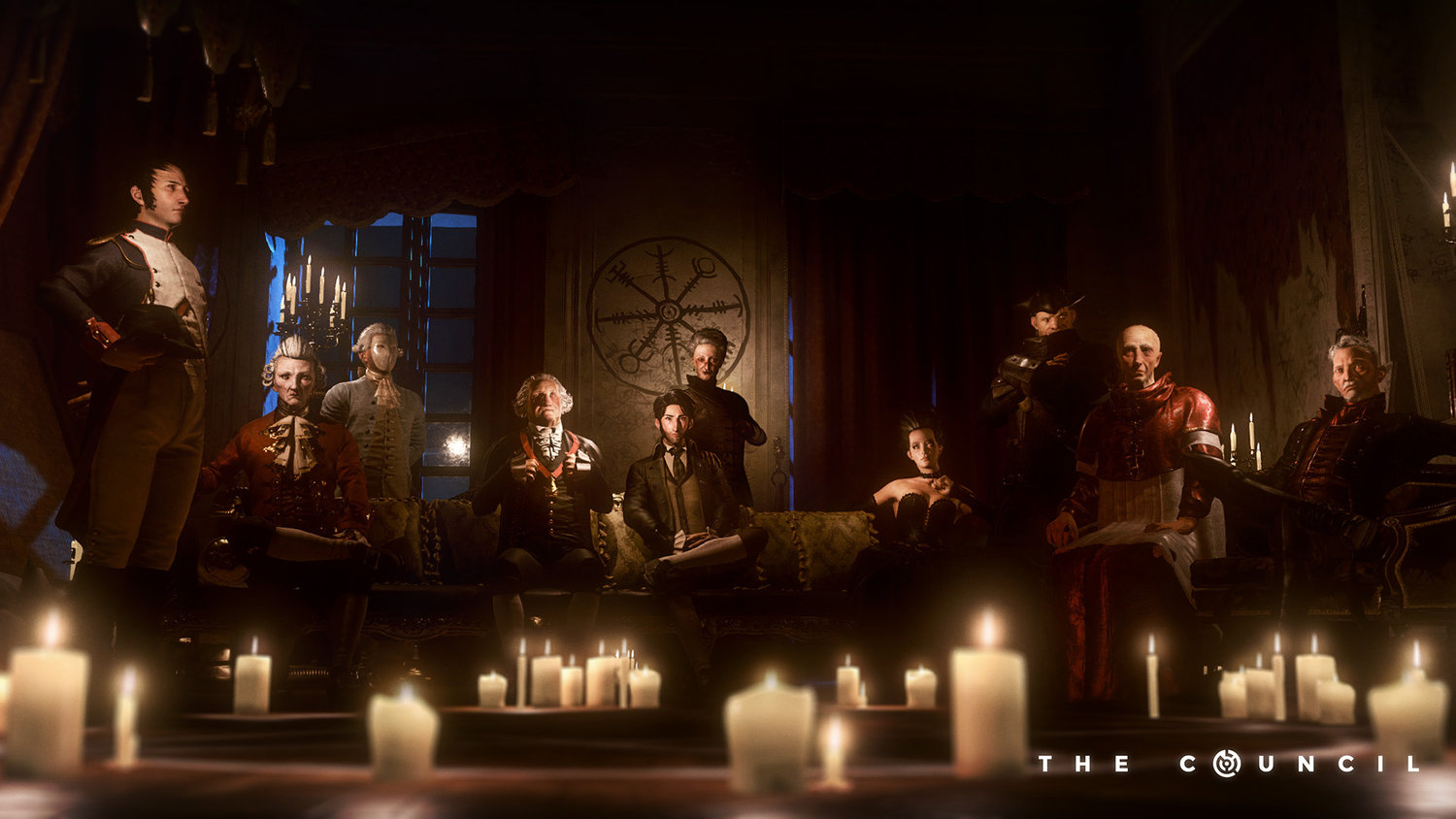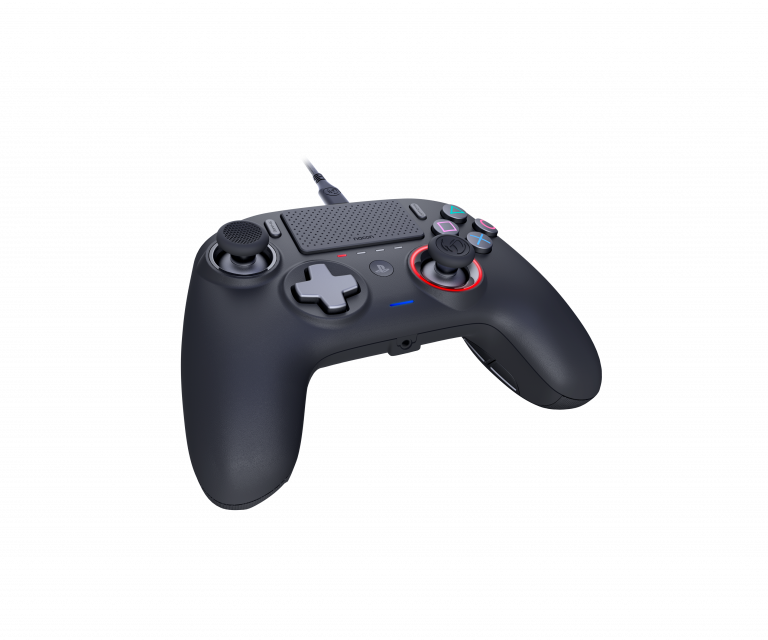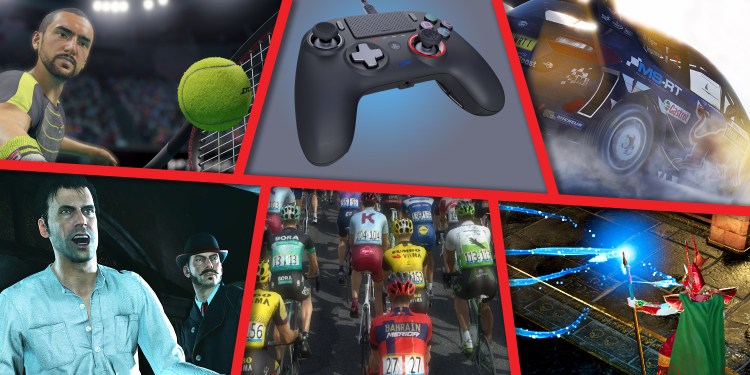
Above: The Council is Big Bad Wolf’s episodic mystery game with RPG elements.
GamesBeat: With the money you raise from an IPO, are you looking at more acquisitions, or are you looking to solidify Nacon with more resources?
Clerc: We’re going to do three things with this money. We’re going to be stronger in the peripherals part of our business. To develop takes time and money, to develop more accessories of the same quality as the Revolution controller. We’re going to develop more games with bigger budgets in order to have bigger and better games more quickly. And we’ll seize opportunities when we find them for other studio acquisitions.
GamesBeat: Are you still looking to put out 12 to 15 games a year, as you said previously?
Clerc: Yes, that’s the average number of games we want in our portfolio per year.
June 5th: The AI Audit in NYC
Join us next week in NYC to engage with top executive leaders, delving into strategies for auditing AI models to ensure fairness, optimal performance, and ethical compliance across diverse organizations. Secure your attendance for this exclusive invite-only event.
GamesBeat: Do you want at least half to be developed internally still, or are you looking to develop more outside Nacon?
Clerc: We want to have more developed internally, because this is the guarantee, to rephrase what I’ve said before — when we know a studio that belongs to the company is hiring people that are just racing specialists or just RPG specialists, that they’re designing tools that are fully dedicated to one genre only, that they’re doing the same thing for years over and over with the same passion, then we can guarantee the level of quality of our games in the end. This is better for us and better for our audience, for the public.
GamesBeat: Is there any concern that you’re going to have one big portion of the company still involved with manufacturing physical goods, and another that’s focused on digital and selling digitally?
Clerc: No. The way the products are sold is not our main synergy consideration. The main point of gathering those two entities is we’ll strengthen the game culture inside of the company, which is extremely important. We do share the same — I would have said expertise, but that’s quite arrogant. I’m not pretending I’m any sort of expert. I do my best to be passionate and to think about my job very seriously, but both on the accessories and peripheral part and on the publishing part, we do share the same passion and interest for gamers. My colleagues from the peripheral side and ourselves on the publishing side, we have one point of interest, which is: What is the game experience that we’re delivering? We’re most of the time delivering a game experience through peripherals, whether it’s a mouse or a keyboard or a gamepad. It enhances both the game culture inside of the Nacon company and the level of expertise that we have when it comes to the quite famous user experience in gaming.
GamesBeat: When it comes to Nacon’s peripheral business, does it have anywhere that’s considered a great strength, whether it’s controllers or keyboards?
Clerc: It’s gamepads. We’re mostly known for having one of the best, if not the best, console gamepads for PS4. It’s a PC controller as well.
GamesBeat: Are you planning on taking that idea with the Revolution and making it for other consoles?
Clerc: Sure. Just like for our games, we’re platform-agnostic. We’ll produce peripherals and games for any device in the future. Any support where our business model and our customers will have the proper level of experience, we’re fine to do so. That’s true also for the accessories.

Above: The Revolution is Nacon’s successful esports-grade controller.
GamesBeat: Where is Nacon’s best market? Is it Europe, or Asia, or the Americas?
Clerc: It depends on if you’re talking about peripherals or games, and with games it’s different. There are games that are extremely popular in Europe, and other games that are more popular in the U.S.. It’s a case by case scenario. We want to be a global company.
GamesBeat: Would you also be interested in opening a Nacon game development studio, that just makes games, not peripherals, but uses the Nacon studio name?
Clerc: Why not? In the future, the criteria — a studio with our brand — whatever the name of the studio, if they’re called Cyanide or KT or Eko or Bigben, what are they good at doing? What do they want to do? We’ll not ask a KT racing developer that’s working for that studio for years, because he or she is a fan of cars and racing, to work on an RPG. That’s not what they want. When you’re a developer, you’re first and foremost a creative person. You want to get up every morning to live a passion for something that’s moving you. You’re putting your gut on the table when you create something, whether it’s a book or a game. You need to be passionate about what you’re doing. The name is not the most important thing.
GamesBeat: Your game portfolio seems like it’s fantastically set up for services like Xbox Game Pass. Do you find that a lot of players are trying your games on Game Pass?
Clerc: Yes, we’re quite happy with the system of Game Pass. Sometimes we have very nice surprises regarding the number of players that are discovering our games thanks to Game Pass.
GamesBeat: Do you think it’s a good way for more mass market gamers to discover who you are?
Clerc: Sure. I think that when there’s an offer like this one, to allow players to pay a few dollars a month to regularly discover new titles, it’s a way for them to discover genres, IP, franchises, game mechanics that they wouldn’t discover on their own. So this is good.
GamesBeat: Do you have any concerns about the lukewarm reception that Stadia has received so far?
Clerc: This is just the beginning of something. I won’t blame anybody. I won’t make any quick conclusions. I won’t say any bad words. This is something that’s technically extremely difficult to produce. This is business-wise extremely difficult. It’s a new way to play games. It will take time. For sure it will take time.
We all know that with 5G, with the big bandwidth, this will be a way of playing for sure in the years to come. All the big names in the entertainment industry and the game industry are dipping their toes in this water, because they know that there is a new way of gaming there. This will not be for this year, and certainly not for next year, and maybe not even the year after that. But it will come.
GamesBeat: Do you expect to support PS4 and Xbox One for a few more years?
Clerc: Yeah, sure. This is impossible to say today, for how long. It depends on the time that those consoles will stay live. No one is able to read the crystal ball today. But for as long as possible, as long as there will be gamers on those machines, we’ll keep on proposing our games.

Above: Services like Xbox Game Pass are a plus for publishers such as Nacon.
GamesBeat: Can services like PlayStation Now and Game Pass extend the life of the older consoles?
Clerc: Good question. I don’t know, honestly speaking. When there is something which is shaking an industry so strongly — I don’t like the word “revolution,” because that’s been overused. Each time you’re producing something that’s quite different, the word “revolution” is brought on the table. But the cloud gaming, you change the way the games are distributed. You change the way they’re played. The purpose is to be able to play anywhere, if you have a fancy controller. If you want to have a good experience on your mobile, on a tablet, this is device agnostic. It will change the way the games are monetized. That’s a lot of changes. How long it will take, when it will work properly, who will be the biggest players in that field, how it will change the way developers, publishers will develop and publish games specifically to address the new usages, how the consumer will react to the new models and those new ways of gaming, that’s a lot of parameters.
Of course many smart brains in our industry are thinking hard in order to evaluate and analyze, and there are many tests currently being done. But saying that this will go this way, it will do that, this is the way it will be in two years from now, I won’t risk myself on any projection. As a content provider, a game publisher, whatever the network, whatever the device, it will remain games that will be played with a peripheral on a screen. That’s the definition of video gaming. For us, we’ll adapt ourselves. We’re content specialists, and in our industry content is games. We try to be games and gamers specialists, with our peripherals and our publishing activity. That’s what we’ll keep on doing with the new distribution methods.
GamesBeat: I enjoy Spiders RPGs. The Switch is a fantastic platform for RPGs. Will Spiders be porting anything to Switch in the near future?
Clerc: We’re thinking about it. Spiders is working on a homebrewed engine, as we say, the Silk engine. There’s also a technological part in this discussion. I’m a big fan of the Switch. I’m playing a lot on this machine. There are indeed avid RPG gamers on the Switch. So stay tuned. Maybe we’ll have a surprise.
GamesBeat: Could the resources you raise from going public help with porting jobs, not just for Spiders games, but for any games at your studios?
Clerc: We won’t buy a studio that will be a porting house. What we want to buy are studios that are experts and passionate developers that are specialists in a genre that we’re interested in for the future.
Correction, 7:40 a.m. Monday, March 2: Nacon’s head of publishing is Benoit Clerc, not Beniot Clerc. I apologize for the error.


